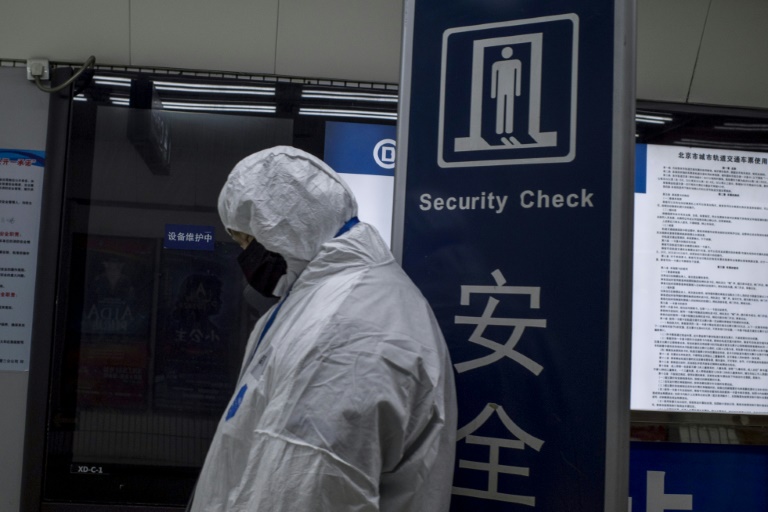
China on Monday extended its biggest national holiday to buy time in the fight against a viral epidemic, as the death toll spiked to 81 despite unprecedented quarantine measures and travel lockdowns.
In a sign of the mounting official concern, Premier Li Keqiang visited the ground-zero province of Hubei to oversee containment efforts in Wuhan, a city of 11 million people where the coronavirus emerged late last year.
The government has sealed off Wuhan and neighboring cities, effectively trapping tens of millions of people, in a bid to contain the spread of the virus.
Thousands of foreigners have also been ensnared in the lockdowns, triggering a scramble from some countries to orchestrate evacuation flights from Wuhan for their citizens.
Twenty-four new deaths were confirmed in Hubei on Monday, and another in the southern island province of Hainan, bringing the overall death toll to 81, while confirmed infections swelled to more than 2,700 nationwide.
A nine-month-old baby in Beijing was among those infected, authorities said, making her the youngest person to have been confirmed to have contracted the virus.
And thousands more patients with flu-like symptoms were suspected to have the virus.
– Holiday ruined –
Authorities around the country have also imposed aggressive curbs on transport during the usually high-traffic Lunar New Year holiday season now underway, in a race to cut off transmission routes.
Typically hundreds of millions of people criss-cross China in jam-packed buses and trains during the Lunar New Year holiday, a time for family reunions.
However those festivities have been ruined this year by the efforts to contain the coronavirus, which can be transmitted between humans like a common flu.
The central government said Monday it would extend the national holiday, initially due to end on January 30, for three days to limit population flows.
Authorities have also closed down popular public gathering spots, including parts of the Great Wall and tourism hotspots such as Shanghai Disneyland.
– Global threats –
With the virus having spread to around a dozen countries, World Health Organization chief Tedros Adhanom Ghebreyesus headed to Beijing to meet government officials to discuss “providing further protection against the outbreak,” he said on Twitter.
The WHO last week stopped short of declaring the outbreak an international public health emergency, which would have prompted more concerted international action including possible trade or travel restrictions.
Cases have been reported as far afield as France, the United States and Canada, with various countries in Asia also detecting cases.
Those infected had previously been in China.
The United States, France and Japan were among the countries looking to evacuate their citizens from Wuhan on Monday.
However, days after plans for the emergency flights were initially floated, none had yet taken off.
Most foreign governments had not announced evacuation plans, and their trapped citizens were growing increasingly fearful.
“I’m getting more concerned everyday,” Do Quang Duy, 32, a Vietnamese masters student in Wuhan, told AFP.
“When I look at the phone, I see dozens of reports and announcements of rising numbers of infected people, as well as deaths. I am very worried.”
– Thousands of cases –
All of the fatalities so far have been in China, with most of those in Hubei.
The government says the deaths have largely been elderly or people already weakened by pre-existing health conditions.
China’s National Health Commission said on Monday that there were 2,744 confirmed infections nationwide, an increase of 769 from the previous day.
In addition, the number of suspected cases also doubled over 24 hours to nearly 6,000.
Wuhan’s mayor Zhou Xianwang, speaking at a press conference while wearing a mask, said on Sunday that around five million people had left the city for the Lunar New Year travel rush in January, further heightening fears about the contagion’s spread.
The virus is suspected of having come from animals in a market that sold a wide range of exotic wild game.
On Sunday, the government said it was banning all trade in wildlife until the emergency is over, but conservationists called for Beijing to make the ban permanent to reduce the possibility of future outbreaks.
It has caused global concern because of its similarity to Severe Acute Respiratory Syndrome (SARS), which killed hundreds across mainland China and Hong Kong in 2002-2003.
– ‘Getting stronger’ –
At a press briefing in Beijing on Sunday, the head of China’s disease control agency, Gao Fu, said it was “not as powerful as SARS,” but officials warned its ability to spread could be getting stronger.
Shandong province in the east and four cities — Beijing, Shanghai, Xi’an and Tianjin — have announced bans on long-distance buses entering or leaving, while some provinces and cities made it mandatory to wear face masks in public.
The crisis has overwhelmed Wuhan’s hospitals, prompting authorities to send hundreds of medical reinforcements including military doctors, and start construction on two field hospitals.
burs-dma/lth/kma
Image: AFP / NOEL CELIS China’s National Health Commission said that in addition to 2,744 confirmed infections nationwide, up 769, there were nearly 6,000 suspected cases and over 30,000 people under observation




